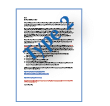Publisher’s note: Specimen letters for practices to send to people with diabetes can be found here:
 |
 |
Headlines
- A third of all COVID-19-related deaths in the first wave were in people with diabetes.1
- People with diabetes are not more likely to catch coronavirus but, if they develop symptomatic COVID-19 requiring hospital admission, the risk of dying is increased 2–3-fold compared to people without diabetes.1
- Amongst people with diabetes admitted to hospital, poor glucose control prior to catching COVID-19 increases the risk of dying, as do high BMI and comorbidities: particularly chronic kidney disease, heart failure and previous stroke.2
- People of black, Asian and other minority ethnic background and those from more deprived areas are also at greater risk.1
- COVID-19 induces a unique pathophysiological change in glucose control (a combination of both severe insulin resistance and insulin deficiency), making the management of people with COVID-19 and diabetes more complex.3
- COVID-19 can trigger new-onset diabetes in previously healthy people4 and can result in life-threatening diabetic ketoacidosis (DKA) and/or hyperosmolar hyperglycaemic state (HHS).5
- New-onset diabetes affects >14% of people admitted to hospital with COVID-19.4
- Corticosteroids should not normally be prescribed to treat COVID-19 that is not severe or critical, because there is risk of harm6,7 (see NICE NG159 Prescribing Briefing).
- People aged ≥65 years and those considered clinically vulnerable who contract symptomatic COVID-19 should be supported with Oximetry@home, with advice about what to do in the event of deterioration. This may include people with diabetes, even if not on the original shielding list (see NHS England Oximetry@home guidance).
- Corticosteroids used in the inpatient management of severe or critical COVID-19 may worsen glucose control and can precipitate hyperglycaemic emergencies, even in previously healthy people.6
- Some people with diabetes, including those not previously diagnosed, may be discharged from hospital on higher doses or additional glucose-lowering therapies, including insulin, that may need adjustment in subsequent days or weeks. Where possible, follow-up and de-escalation should be picked up by specialist services, but where not possible (due to demands of supporting the acute pandemic response), clear communication and collaboration between specialists and primary care or community teams is vital.
- There is a heightened need for good communication between diabetes services at present. In some areas, specialists are providing emergency lines to support primary care.
- Concern has arisen regarding overlooked new-onset type 1 diabetes in children and young people. Breathlessness due to acidosis in DKA may be wrongly attributed to COVID-19, resulting in late presentation,8 risking increased morbidity (e.g. cerebral oedema, hypokalaemia, multiorgan failure) and mortality.
- People with diabetes report additional stress and increasing concern about access to routine diabetes care as a consequence of the pandemic. Stress may be made worse by a lack of communication about local service provision and how to access care in the event of clinical concern.
- There is a risk that fear of exposure to COVID-19 or difficulty accessing clinical services may contribute to late clinical presentations or assessment of diabetes complications.
- Vaccine uptake may be lower in some populations at greater risk of adverse COVID-19 outcomes, including people of black, Asian and other minority ethnic background and other white ethnic groups. Barriers to uptake include access, perception of risk, low confidence in the vaccine and sociodemographic factors, as well as lack of endorsement and communication from trusted providers and community leaders.9
Recommendations
We understand the challenges facing all clinicians working in diabetes care and commend everyone for their part in the response to the pandemic. Given that many practices currently have reduced capacity, we have recommended resources to support you in whatever you can do to deliver diabetes care despite the ongoing challenges.
Whilst continuing the COVID-19 response, and where possible, we recommend the following:
- Practices should maintain clinically important diabetes reviews.
- Recalls should be prioritised on the basis of clinical need (see How to prioritise primary care diabetes services during and post COVID-19 pandemic).
- Although biometric parameters (e.g. last recorded HbA1c, blood presure, eGFR) offer easier methods for clinical prioritisation, other factors should be included when determining priority, such as pregnancy planning, mental health concerns, new-onset or worsening foot or eye disease, recent A&E attendance, admission for a diabetes-related complication or vulnerability for other reasons (e.g. learning disability, serious mental illness or frailty).
- Practices should collaborate with local specialist diabetes teams to maximise opportunity for reviewing people with diabetes whilst minimising duplication.
- Practices should recognise that some people with diabetes may be concerned about attending for face-to-face review because of the risks associated with catching COVID-19.
- People with diabetes should be supported in preparation for their review and afterwards (see At a glance factsheet: Sources of information and education for people with diabetes to support remote consulting).
- Use telephone, video and e-consultation tools to support attendance.
- Make use of remotely gathered information (e.g. self-reported weight, home capillary glucose or blood pressure data), ensuring that face-to-face consultations continue to be offered where clinically appropriate or for those with limited digital access (see How to undertake a remote diabetes review).
- Maintain awareness of diabetes-related complications and risk of progression as a consequence of reduced access to care. In particular, consider the risk of progressive foot disease and offer face-to-face assessment or, where this is not possible or declined, remote examination. Refer promptly where concerns are identified.
- Remain vigilant for symptoms of new-onset type 1 diabetes, particularly in children and young people who are unwell.
- Consider the 4Ts – Toilet, Thirsty, Tiredness, Thinner (see Do you know the 4 Ts of type 1 diabetes?).
- Check urine for glucose and ketones, and do a finger-prick glucose test. If the random point-of-care glucose is >11.0 mmol/L, refer immediately (same day) to your local acute paediatric or adult medical service, as appropriate.
- Capillary glucose and urinary or capillary ketone levels should be checked in people presenting acutely unwell with suspected COVID-19 or possible diabetes-related emergency.
- Familiarise yourself with sick day rules for people with diabetes (see How to advise on sick day rules).
- Insulin therapy should never be stopped during intercurrent illness but some oral therapies, in particular metformin and SGLT2 inhibitors, may warrant temporary suspension during the acute illness phase. They can usually be re-started once the acute phase has passed and the individual is eating and drinking again.
- Information for people with diabetes is available from NHS England: Type 1 diabetes | Type 2 diabetes.
- Be aware of the risk of euglycemic DKA during acute intercurrent illness in people prescribed SGLT2 inhibitors, even in the presence of relatively normal blood glucose levels (see Diabetic ketoacidosis with SGLT2 inhibitors).
- Manage expectations in people awaiting diabetes review. If you are unable to offer service as usual, communicate with those who are waiting and keep them informed.
- Highlight areas of concern that should trigger a contact with the clinical team and signpost to self-help resources.
- In particular, encourage people with diabetes to seek help with any of the following:
- Difficulties with blood glucose control or symptoms worse than normal (4Ts – toilet, thirsty, tired, thinner).
- New or worsening foot or eye problems.
- Recurrent infections.
- Concerns with mental health.
- Women who are pregnant or planning pregnancy.
- Recent ambulance call-out, A&E attendance or emergency hospital admission.
- See specimen letters, for local adaptation, with linked resources (Type 1 diabetes | Type 2 diabetes).
- Healthcare professionals (HCPs) have an important role in promoting uptake of COVID-19 vaccination. As trusted and respected members of their communities, they are well placed to support engagement with health messaging and vaccine distribution strategies that are sensitive to their local communities.
- HCPs should support access to multilingual, non-stigmatising communications, including vaccine offers and endorsements from trusted sources to increase awareness and understanding, and to address different religious and cultural concerns within the communities they serve (see SAGE’s Factors influencing COVID-19 vaccine uptake among minority ethnic groups).
Important resources
Specimen letters (for local adaptation):
- For people with type 1 diabetes: click here
- For people with type 2 diabetes: click here
Management of COVID-19 (for healthcare professionals):
- UK Government information on COVID-19, including guidance on the assessment and management of suspected UK cases: click here
- NICE COVID-19 rapid guideline: managing symptoms (including at the end of life) in the community: click here
- NICE COVID-19 prescribing briefing – corticosteroids: click here
- World Health Organization Therapeutics and COVID-19: living guideline: click here
COVID-19 and diabetes (for healthcare professionals):
- Latest NHS information and advice about COVID-19: click here
- PCDS COVID-19 resource centre: click here
- The ABCD COVID-19 resource page outlines acute guidance from the National Inpatient Diabetes COVID-19 Response Team and includes information on management of hyperglycaemia with dexamethasone and safe discharge planning: click here
- Diabetes UK’s Advice for healthcare professionals on coronavirus (COVID-19) and diabetes: click here
Sick day rules (NHS guidance for people with diabetes):
- Sick day rules for patients on multiple daily injections (MDI): how to manage type 1 diabetes if you become unwell with coronavirus: click here
- Sick day rules for patients on an insulin pump: how to manage type 1 diabetes if you become unwell with coronavirus: click here
- Sick day rules: How to manage type 2 diabetes if you become unwell with coronavirus and what to do with your medication: click here
Self-management support for people with diabetes:
- My Type 1 Diabetes: click here
- NHS Healthy living for people with type 2 diabetes: click here
- Diabetes UK Updates: Coronavirus and diabetes: click here
- Diabetes UK Diabetes when you’re unwell (includes sick day rules): click here
- Diabetes UK Learning zone (for all people with diabetes): click here
- Diabetes UK Children and diabetes: click here
Multilingual COVID-19 resources:
- Doctors of the World offer advice in 60 different languages: click here
- South Asian Health Foundation provides resources, including videos supporting uptake of vaccination: click here
- Diabetes UK offers information, including sick day rules, in 12 different languages: click here
Resources from Diabetes UK on diabetes and emotional wellbeing:
- Information for people with diabetes: click here
- Information for healthcare professionals: click here
Resources from Diabetes UK on footcare:
- Information for people with diabetes including how to recognise signs of a foot problem and advice about how to look after their feet, including the Touch the Toes test: click here
- Our downloadable Diabetes and looking after your feet leaflet can be printed or sent to your patients with diabetes as a PDF: click here
Resources from Diabetes UK on remote diabetes appointments:
- Information about preparing for remote appointments. Also available to download as a PDF leaflet: click here
- Information about remote consultations for healthcare professionals: click here
Other useful resources from Diabetes UK:
- Capacity to support people newly diagnosed with type 2 diabetes might be limited at present. Diabetes UK’s new AccuRx template will signpost people to support from Diabetes UK.
- Title: Diabetes UK – T2DM new diagnosis
- Body: Finding out you’ve got type 2 diabetes can feel overwhelming. If you’re not sure where to start, Diabetes UK has helpful resources on understanding your condition and meeting other people who have it too. www.diabetes.org.uk/diabetes-info
- Our position statements on diabetes care during the COVID-19 pandemic, and managing risk for people with diabetes from COVID-19: click here
- Our downloadable information for people with diabetes about their diabetes care during the COVID-19 pandemic, including what checks they should expect: click here
- Other information resources are available to order or download from our online shop: click here





Quick links to the best resources, publications and research for all nurses with an interest in diabetes.
20 Jun 2025